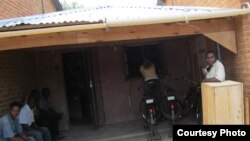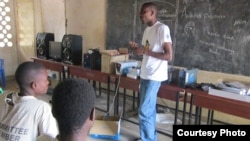A local non-proft organization and its partners have embarked on an innovative project to provide electricity to rural communities that have no electricity. Two pilot “energy kiosks” now bring solar energy for a small fee to rural Malawi residents not connected to the national electricity grid.
Residents of the two remote communities are far from Malawi’s power grid but can now rent small battery packs to light their homes and charge their electronic devices with solar power.
With start-up funding from the Scottish Government, the Rural Off-Grid Energy Kiosks project, the first of its kind in Malawi, has piloted energy kiosks in each of two southern districts of Thyolo and Phalombe targeting about 400 households.
Carry-out solar power
Residents go to one of these energy kiosks, a small building topped with solar panels that collect solar energy by day to store in small portable battery boxes. Neighbors come to the kiosk to rent battery boxes to take home to light their homes at night, recharge their cell phones, computers and other electronic devices and return the battery boxes to the kiosk the next day for recharging.
Martina Kunert, the country director of Renew’N’Able Malawi (RENAMA), the NGO that’s implementing the effort, said, “The project was about testing the concept of community-based rental and charging stations which in this pilot generate power from solar photo-voltaic solar panels. They can also use other generation technologies, from where surrounding households can rent out battery boxes for their homes together with D/C accessories like light bulbs, phone and laptop chargers and even small low-power TV screens.”
Sustainable neighborhood management
Kunert said the kiosks are managed by two paid managers hired from the surrounding communities who are monitored and supported by a locally elected community group.
She said each kiosk has a committee of 15 volunteers from existing elected bodies.
“For example, representatives from school committees, traditional authorities and the police. So these monitor the kiosk managers and make long-term financial plans.”
The pilot phase of the project was funded by the Scottish Government until end June 2013, and was supported by RENAMA and Concern Universal field facilitators. Equinox Limited, an energy strategy company specializing in the electricity kiosk concept, provided conceptual consultancy and monitoring.
Kunert said each committee reinvests funds received from rental fees of batteries and other devices to pay for the maintenance of damaged equipment and the salaries f the kiosk managers and guards.
Since the inception of the project, Kunert says, it has helped transform lives of many customers.
Over 160 portable battery systems have so far been rented out to households.
The solar-powered batteries reduced health risks and increase home productivity, said Kunert.
Safer than paraffin
“We have seen a very big impact,” Kunert said. “We have done the survey among the users in June and it has shown that in terms of health effects, people feel very much relieved in terms of coughing not being so bad because they don’t use paraffin anymore in their houses. The students at Dzenje primary school [under Phalombe Project] where the school was electrified have also said they are really delighted to be given an opportunity to study in the evening”.
She said villagers are charging phones for their neighbors and some who operate small shops selling groceries such as soap or matches can stay open longer after sunset by running their shop lights with batteries charged on solar power.
A new product, a small portable battery box with small solar collectors, called the stand-alone solution, is now available for rent at a higher fee. Approximately 15 of these new boxes are rented to small businesses such as cinemas and barber shops.
RENAMA also rents solar collector panels that can be mounted on the roof of a house or business to provide a 24-hour power source.
‘I charge every two days’
“Personally, this project has assisted me much because I have been spending a lot of money to charge my phone,” said Reverend Watson Kazembe of Dzenje in Phalombe.
“I charge every two days, I pay K50 ($0.05) so by the end of the month I was paying a lot of money. And instead of using paraffin which was scarce in our area, we are using torches (flash lights) and used to buy three batteries at K150 ($0.20) each, so with this coming of energy we have saved a lot. I am able to charge my phone freely so I have the light at night so I can now save almost K2,000 ($6) a month.”
Another customer, Mary Macheso, said the project has helped reduce the distance - about eight kilometers – some people needed to walk to charge their phones and car batteries at a nearby trading centre.
Despite the progress, Kunert said they have not yet considered expanding the project to other areas. “At the moment we really want to finish the learning process because it has been not even a year that the kiosks have been there, so we are gathering a lot of information and we’ll see where it can be improved.
“We are developing proposals to submit to donors and work with partners on how we can improve the models and the whole system so that we can cover all the areas that are not electrified in Malawi.”
She said they regularly report the progress to District Executive Committees and Department of Energy in order to develop further ideas to make the project sustainable.
Residents of the two remote communities are far from Malawi’s power grid but can now rent small battery packs to light their homes and charge their electronic devices with solar power.
With start-up funding from the Scottish Government, the Rural Off-Grid Energy Kiosks project, the first of its kind in Malawi, has piloted energy kiosks in each of two southern districts of Thyolo and Phalombe targeting about 400 households.
Carry-out solar power
Residents go to one of these energy kiosks, a small building topped with solar panels that collect solar energy by day to store in small portable battery boxes. Neighbors come to the kiosk to rent battery boxes to take home to light their homes at night, recharge their cell phones, computers and other electronic devices and return the battery boxes to the kiosk the next day for recharging.
Martina Kunert, the country director of Renew’N’Able Malawi (RENAMA), the NGO that’s implementing the effort, said, “The project was about testing the concept of community-based rental and charging stations which in this pilot generate power from solar photo-voltaic solar panels. They can also use other generation technologies, from where surrounding households can rent out battery boxes for their homes together with D/C accessories like light bulbs, phone and laptop chargers and even small low-power TV screens.”
Sustainable neighborhood management
Kunert said the kiosks are managed by two paid managers hired from the surrounding communities who are monitored and supported by a locally elected community group.
She said each kiosk has a committee of 15 volunteers from existing elected bodies.
“For example, representatives from school committees, traditional authorities and the police. So these monitor the kiosk managers and make long-term financial plans.”
The pilot phase of the project was funded by the Scottish Government until end June 2013, and was supported by RENAMA and Concern Universal field facilitators. Equinox Limited, an energy strategy company specializing in the electricity kiosk concept, provided conceptual consultancy and monitoring.
Kunert said each committee reinvests funds received from rental fees of batteries and other devices to pay for the maintenance of damaged equipment and the salaries f the kiosk managers and guards.
Since the inception of the project, Kunert says, it has helped transform lives of many customers.
Over 160 portable battery systems have so far been rented out to households.
The solar-powered batteries reduced health risks and increase home productivity, said Kunert.
Safer than paraffin
“We have seen a very big impact,” Kunert said. “We have done the survey among the users in June and it has shown that in terms of health effects, people feel very much relieved in terms of coughing not being so bad because they don’t use paraffin anymore in their houses. The students at Dzenje primary school [under Phalombe Project] where the school was electrified have also said they are really delighted to be given an opportunity to study in the evening”.
She said villagers are charging phones for their neighbors and some who operate small shops selling groceries such as soap or matches can stay open longer after sunset by running their shop lights with batteries charged on solar power.
A new product, a small portable battery box with small solar collectors, called the stand-alone solution, is now available for rent at a higher fee. Approximately 15 of these new boxes are rented to small businesses such as cinemas and barber shops.
RENAMA also rents solar collector panels that can be mounted on the roof of a house or business to provide a 24-hour power source.
‘I charge every two days’
“Personally, this project has assisted me much because I have been spending a lot of money to charge my phone,” said Reverend Watson Kazembe of Dzenje in Phalombe.
“I charge every two days, I pay K50 ($0.05) so by the end of the month I was paying a lot of money. And instead of using paraffin which was scarce in our area, we are using torches (flash lights) and used to buy three batteries at K150 ($0.20) each, so with this coming of energy we have saved a lot. I am able to charge my phone freely so I have the light at night so I can now save almost K2,000 ($6) a month.”
Another customer, Mary Macheso, said the project has helped reduce the distance - about eight kilometers – some people needed to walk to charge their phones and car batteries at a nearby trading centre.
Despite the progress, Kunert said they have not yet considered expanding the project to other areas. “At the moment we really want to finish the learning process because it has been not even a year that the kiosks have been there, so we are gathering a lot of information and we’ll see where it can be improved.
“We are developing proposals to submit to donors and work with partners on how we can improve the models and the whole system so that we can cover all the areas that are not electrified in Malawi.”
She said they regularly report the progress to District Executive Committees and Department of Energy in order to develop further ideas to make the project sustainable.





